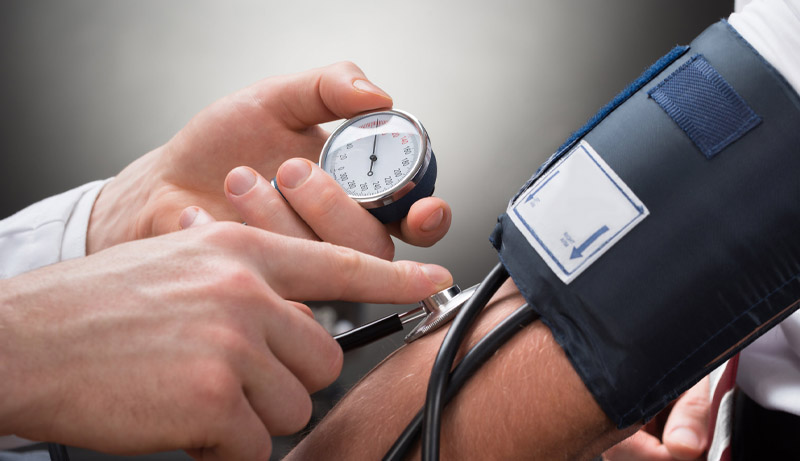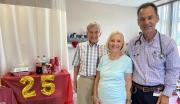
When it comes to your heart, it is easy to push it to the back of your mind and live with the assumption that heart disease only happens to older people or that you would have symptoms if you did have a problem. Some people may have a family history of heart disease and they shrug it off, assuming the lot has been cast and there is nothing they can do about it. Before you casually reach for another cheeseburger and fries it is important to understand that cardiovascular disease claims more lives each year than any other condition. Cardiologist, Dr. Gene Iucci, DO FACC with Penn Cardiology-Somers Point says that you can lower your risk factors and get heart smart by separating the truth from the myths. Dr. Iucci busted some of the most common heart health myths with the facts.
Myth: You have been diagnosed with heart disease so you need to take it easy.
Dr. Iucci said that is false. “Physical activity is important,” said Dr. Iucci. “Even after any type of revascularization, which is the restoration of blood flow to the heart with a bypass or stent, I advise my patients to get back to physical activity and physical therapy within a week to two weeks, depending upon the procedure.”
Myth: If you are taking a cholesterol-lowering medication you no longer have to watch your diet.
False. According to Dr. Iucci, diet modification is a mainstay of therapy. “Diet and exercise are so important. Ninety percent of heart disease could be avoided if an individual’s risk factors are managed properly. Risk factors include hypertension or high blood pressure, smoking and diabetes,” said Dr. Iucci.
Myth: It is okay to have high blood pressure when you are older, everyone has it.
While higher blood pressure or hypertension is common in older people, it is important to treat it aggressively, advised Dr. Iucci. “There are a number of factors that contribute to high blood pressure. As we age our arteries get a little more calcified, have less elasticity and may have a build-up of calcified plaque on the walls of our arteries that would lend to higher blood pressure,” said Dr. Iucci. Renal insufficiency, arterial fibrillation and heart disease are all results of hypertension.
Myth: If you take diabetes medication, your diabetes will not cause heart disease
This is completely false, according to Dr. Iucci. “Diabetes is a large risk factor for coronary heart disease, heart attack, stroke and it must be treated,” said Dr. Iucci. “I tell my patients to stay vigilant with their diet and to exercise.”
Myth: Taking vitamins and supplements will help lower your risk of heart disease.
This one is not completely false, according to Dr. Iucci. “I never recommend supplements to my patients but for some, if they tolerate it well, I might suggest they use an over-the-counter product such as Metamucil that contains psyllium to help lower their cholesterol by a few points,” said Dr. Iucci. He went on to explain that Metamucil helps bind fat to be excreted and in doing so, absorbs more of the cholesterol and it is excreted rather than stored. Dr. Iucci added that he tells his patients that it is okay to take a multivitamin as part of their daily regimen.
Myth: If you were a long-time smoker, quitting does not reduce the risk.
“You 100 percent can reduce your risk factors by quitting smoking,” said Dr. Iucci. “Weeks to months after quitting smoking and we can see improvements from a cardiology and pulmonary standpoint. The number one risk factor for coronary artery disease is smoking. It is the most preventable action a person can take to help reduce their risk factors.”
Myth: Heart disease is a man’s problem.
Heart disease is an equal opportunity problem that women as well as men face. “Women present with atypical symptoms. They may experience jaw pain, arm pain or diastolic dysfunction, when the heart is not able to relax fast enough where men may have more typical symptoms like chest and shoulder pain,” said Dr. Iucci. “If a woman is experiencing any of the symptoms or if they are exhausted after minor exertion they should follow up with their cardiologist.”
Myth: If you have heart disease you should eat as little fat as possible.
Dr. Iucci said this is partially true. “We should cut down the amount of fat in our diet but we still need some fats,” said Dr. Iucci. “Lean protein, leafy vegetables and nuts are suggested. The American College of Cardiology recommends the Mediterranean diet as a heart-healthy diet.
Myth: A small heart attack is no big deal.
It is important to be aware of even the smallest heart attack. “There are some mild heart attacks that do not cause damage and may be due to stress, like pneumonia and the patient recovers,” explained Dr. Iucci. “But it is still a heart attack and all heart attacks are serious.”
Myth: Angioplasty and stents or bypass fix your heart.
“Surgeons can fix blockages in the heart, they can perform a bypass, put in a stent or do angioplasty to improve heart function and get patients back to normal. At the same time it is so important that risk factors like smoking and diet and the things that contributed to the problem are kept in check,” concluded Dr. Iucci.
To make an appointment with Dr. Gene Iucci at Penn Cardiology-Somers Point, 155 Medical Center Way in Somers Point, NJ, call 609-365-3100 or visit www.pennmedicine.org.










